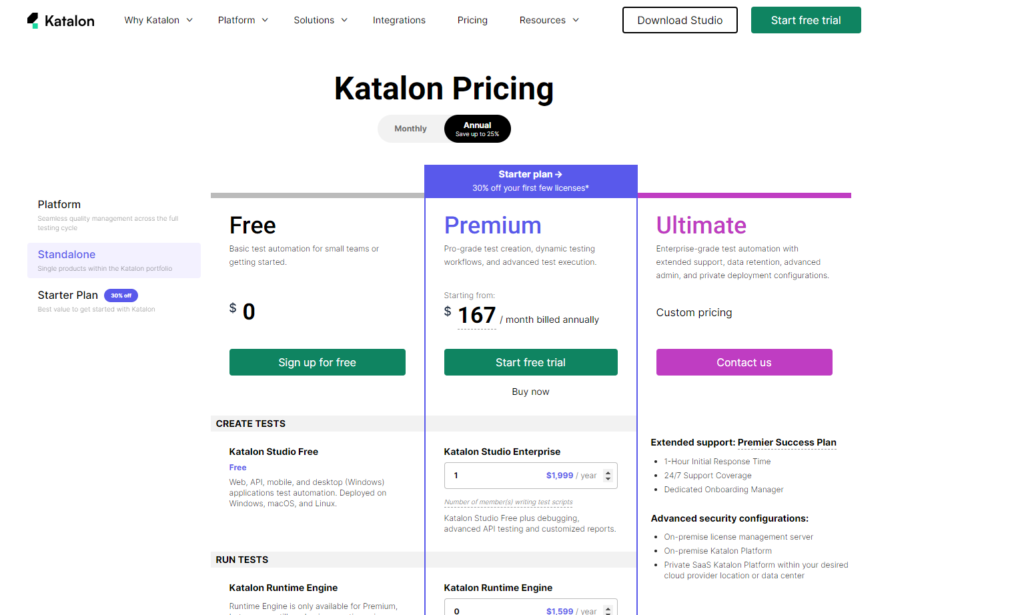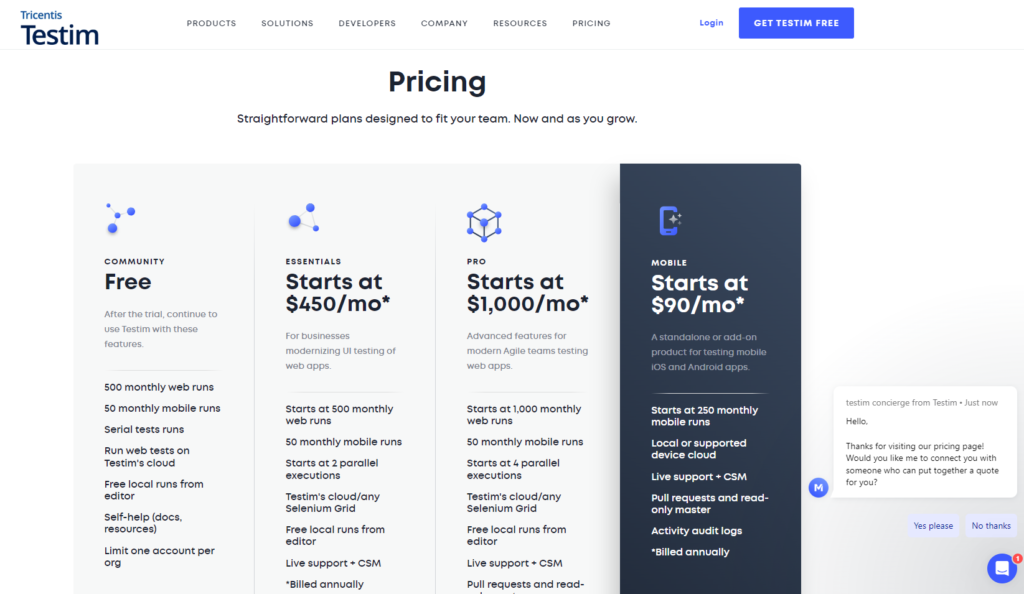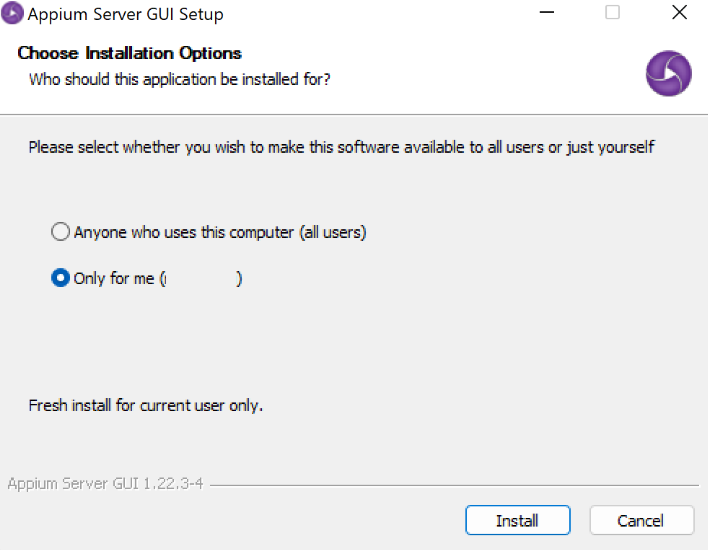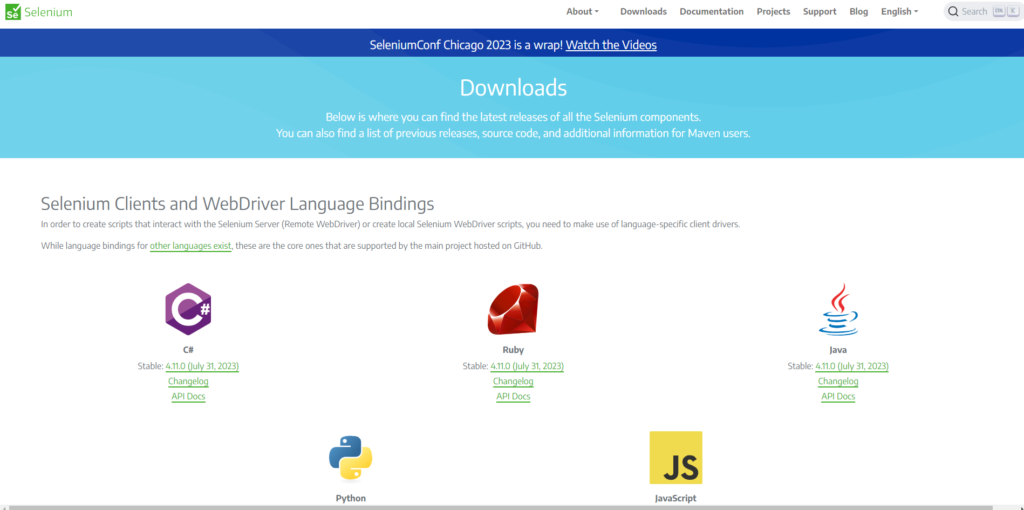In today’s rapidly evolving digital landscape, where web applications are ubiquitous, ensuring their quality and reliability is more critical than ever. That’s where web application testing tools come into play. With these powerful software tools, developers and testers can evaluate, validate, and optimize web applications efficiently.
Throughout this guide, we’ll examine the best web application testing tools available to developers and testers. You’ll learn how to navigate the vast landscape of testing tools whether you’re a seasoned developer or a curious newcomer.
We will cover a wide range of web application testing tools, including both commercial and open-source options. There are a variety of tools designed to address diverse testing needs, from automation frameworks to cloud-based platforms.
Quick List of 10 Best Web Application Testing Tools
Below is a list of remarkable web application testing tools we’ve selected —
- LambdaTest: A scalable cross-browser testing platform with extensive device coverage.
- Katalon Studio: A powerful and user-friendly web automation testing tool with comprehensive features.
- Testim: An AI-powered testing tool that accelerates test creation and maintenance.
- QA Wolf: A developer-friendly web automation testing tool with simplified syntax.
- Appium: An open-source automation framework specifically designed for mobile applications.
- BrowserStack: A cloud-based platform for real-time cross-browser and device testing.
- Testsigma: A cloud-based test automation platform with AI-driven testing capabilities.
- TestComplete: A comprehensive automated testing tool for web, mobile, and desktop applications.
- Selenium: A popular open-source testing framework for web applications with broad community support.
- Cypress: A modern JavaScript-based testing framework for intuitive and efficient web application testing.
Comparison Chart of Web Application Testing Tools
If you’re pressed for time, take a look at the chart to get a quick idea.
Tools | Key Features | Integration | Scripting Language Support | Cross Browser Testing | Mobile Testing | Pricing |
 | Cross-browser testing platform | Jenkins, GitLab | Multiple scripting languages | Yes | Yes | |
 | Easy test case management | CI/CD, Jira, Slack | Java, Groovy, JavaScript, etc. | Yes | Yes | |
 | AI-powered self-healing | GitHub, Jenkins | JavaScript, TypeScript | Yes | No | |
 | JavaScript-based automation | GitHub, CircleCI | JavaScript | Yes | No | |
 | Cross-platform mobile testing | Jenkins, CircleCI | Multiple scripting languages | Yes | Yes | |
 | Real device and browser testing | Jenkins, Travis CI | Multiple scripting languages | Yes | Yes | |
 | Codeless test automation | Jenkins, GitLab | JavaScript, Java, Python | Yes | Yes | |
 | Keyword-driven test automation | Jenkins, TeamCity | JavaScript, Python, VBScript | Yes | Yes | |
 | Widely-used web automation tool | Jenkins, Bamboo | Java, C#, Python, Ruby | Yes | Yes | |
 | Fast and reliable test automation | Jenkins, GitLab | JavaScript | Yes | Yes |
What are the Tools for Web Application Testing?
Web app testing tools are software applications designed to assist developers and testers in the process of evaluating and validating web applications. Tools like these automate testing tasks, increase efficiency, and ensure the quality and reliability of web applications.
One important subset of web application testing tools open source is continuous testing tools. Continuous testing is an essential practice in modern software development methodologies like Agile and DevOps.
The process enables fast feedback on code quality and reduces defects reaching production, by integrating testing activities throughout the entire development process.
Continuous testing tools facilitate the implementation of continuous testing practices by automating various aspects of the testing process. They help streamline the testing workflow, enable efficient test execution, and provide valuable insights into the application’s behavior and performance.
These tools often include features such as test automation frameworks, test management systems, and test reporting and analysis capabilities. Continuous integration and continuous delivery (CI/CD) pipelines can use them to create and execute automated tests.
Development teams can continuously verify web applications’ functionality, performance, and security by using continuous testing tools. It ensures faster software delivery by identifying and addressing problems early.
Continuous testing tools also contribute to collaboration and visibility within development teams. They facilitate communication between developers, testers, and other stakeholders by providing shared dashboards, test reports, and notifications on the status of test execution and results.
In addition, these tools often integrate with popular development and testing frameworks, version control systems, and project management tools. This integration capability enables seamless coordination between different tools and enhances the overall efficiency of the web testing process.
Best Software and Web Application Testing Tools?
Let’s deep dive into the web automation testing tools —
1. LambdaTest
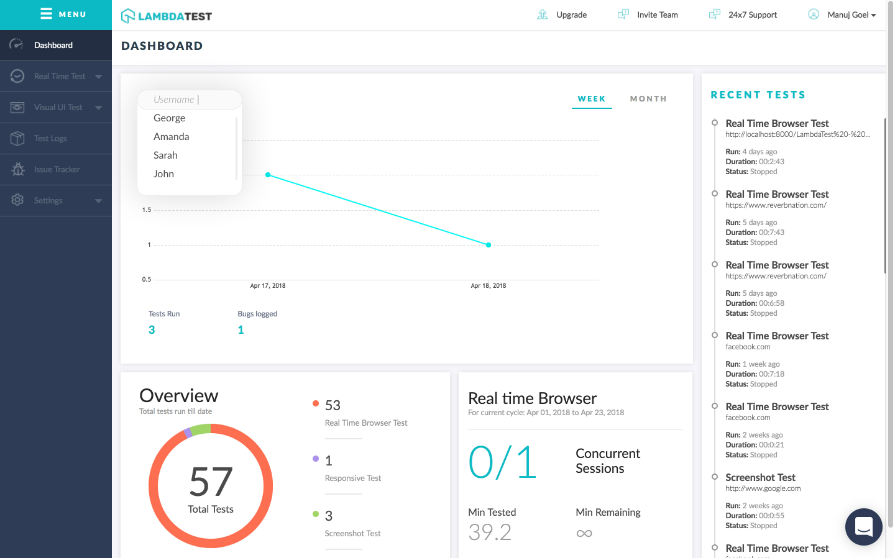
LambdaTest is a cloud-based cross-browser testing platform. It allows testers to perform automated and manual testing tools for web applications across a wide range of browsers, devices, and operating systems.
With its scalable infrastructure and collaborative features, LambdaTest empowers teams to ensure compatibility and deliver high-quality web applications.
About LambdaTest
LambdaTest is a rapidly growing platform trusted by numerous organizations worldwide. While specific information about the company’s valuation and employee numbers is not publicly available, their focus on providing a reliable and scalable testing solution is evident in their tool.
Key Features of LambdaTest

- Real-time testing on 2,000+ browser and operating system combinations
- Integration with popular development and collaboration tools
- Automated screenshot testing and visual regression testing
- Test scheduling and parallel testing for faster feedback
- Network simulation and debugging tools
Pros of using LambdaTest
- Extensive browser and operating system coverage for comprehensive testing
- User-friendly interface with real-time testing capabilities
- Collaborative features for seamless team collaboration
- Advanced testing capabilities, such as screenshot testing and network simulation
Cons of using LambdaTest
- Pricing may be a concern for small or budget-conscious teams
- Limited access to some advanced features in lower-tier plans
Pricing
LambdaTest offers various pricing plans based on the needs of different organizations, with different levels of features and support.
Our Review of LambdaTest
LambdaTest provides a reliable and scalable cross-browser testing platform, offering an extensive range of browser and operating system combinations for comprehensive testing.
With its user-friendly interface, real-time testing capabilities, and collaborative features, LambdaTest proves to be a valuable tool for teams seeking efficient testing processes.
However, pricing may be a consideration for smaller teams or those on a tight budget, and access to advanced features may require higher-tier plans.
Overall, LambdaTest’s comprehensive testing capabilities and focus on collaboration make it a strong choice for ensuring compatibility and delivering high-quality web application testing.
Lambdatest competitors for cross-browser testing
2. Katalon Studio
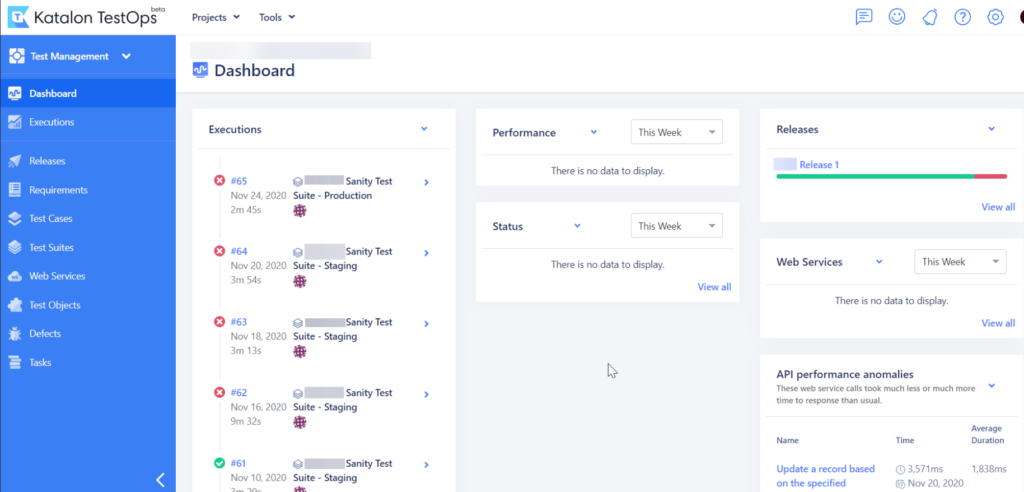
Katalon Studio is a powerful web automation testing tool widely used by software development and testing professionals. It’s user-friendly interface and extensive feature set make it an excellent choice for both beginners and experienced testers.
With Katalon Studio, you can create and execute automated tests efficiently, saving time and effort.
About Katalon Studio
- Katalon Studio, founded in 2015
- Boasts a valuation of $20 million
- Has a team of over 100 employees
The company focuses on providing robust testing solutions to improve software quality.
Key Features of Katalon Studio

- Integrated Development Environment (IDE)
- Cross-browser testing
- Mobile app testing
- Test case management
- Continuous Integration (CI) integration
Pros of using Katalon Studio
- Easy-to-use interface
- Comprehensive test automation capabilities
- Supports multiple scripting languages (Java, Groovy, etc.)
- Extensive reporting and analytics
Cons of using Katalon Studio
- Limited support for advanced testing scenarios
- Steeper learning curve for complex test scenarios
Pricing
Katalon Studio offers both free and commercial versions. The commercial licenses provide additional features and support.
Our Review of Katalon Studio
Katalon Studio is an excellent choice for testers looking for a versatile and user-friendly website automation testing tool. Its wide range of features, robust reporting capabilities, and support for multiple scripting languages make it a strong contender in the market.
However, it may not be suitable for complex testing scenarios that require highly customizable workflows.
3. Testim
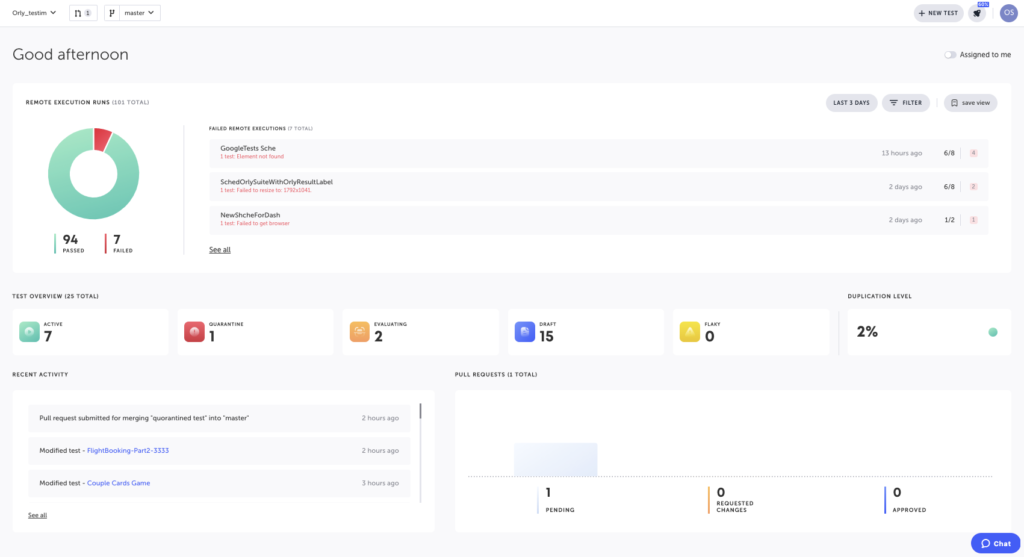
Testim is a popular web app testing tool known for its AI-powered testing capabilities. By leveraging machine learning algorithms, Testim accelerates test creation and maintenance, helping teams achieve faster feedback cycles and higher test coverage.
About Testim
- Founded in 2015
- Testim has a valuation of $40 million
- a dedicated team of testing experts
The company aims to revolutionize test automation by providing AI-driven solutions.
Key Features of Testim

- AI-powered self-healing tests
- Test authoring using natural language processing (NLP)
- Intelligent test execution and maintenance
- Cross-browser and mobile testing
- Integration with popular CI/CD tools
Pros of using Testim
- Rapid test creation and maintenance
- Self-healing tests reduce maintenance efforts
- Seamless integration with existing workflows
- NLP-based test authoring simplifies test creation
Cons of using Testim
- Limited support for advanced test scenarios
- Dependency on machine learning algorithms for optimal performance
Pricing
Testim offers flexible pricing options based on the specific needs of each organization, including both free and commercial plans.
Our Review of Testim
Testim’s AI-powered testing capabilities provides a significant advantage for teams looking to speed up their testing processes. The ability to create and maintain tests using natural language and the self-healing feature greatly reduces maintenance efforts.
If you have complex testing requirements or prefer more control over test scenarios, Testim may not be a good choice.
4. QA Wolf
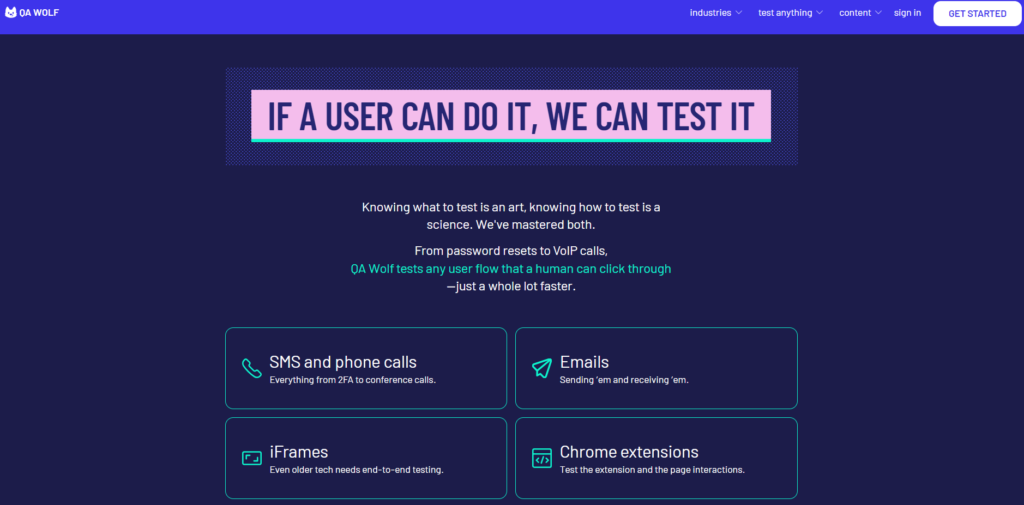
QA Wolf is one of the powerful web automation testing tools that focuses on simplifying the testing process. With its intuitive syntax and built-in debugging capabilities, QA Wolf empowers developers and testers to create reliable automated tests efficiently.
About QA Wolf
QA Wolf, a relatively new player in the market, has gained popularity for its simplicity and developer-friendly approach. While the company’s valuation and employee numbers are not available, their dedication to providing an intuitive testing experience is evident in their tool.
Key Features of QA Wolf

- Simplified test automation with a focus on developer productivity
- JavaScript-based testing framework
- Debugging capabilities for quick issue resolution
- Extensive documentation and community support
Pros of using QA Wolf
- Easy-to-understand syntax and intuitive testing framework
- Quick setup and debugging capabilities for efficient test creation
- Strong focus on developer productivity and collaboration
- Active community support for problem-solving and best practices
Cons of using QA Wolf
- Limited advanced testing features compared to more established tools
- Relatively new in the market, so fewer online resources and tutorials are available
Pricing
QA Wolf offers a free plan with basic features. They also provide paid plans with additional features and support.
Our Review of QA Wolf
QA Wolf stands out for its simplicity and developer-friendly approach to test automation. The tool’s intuitive syntax and debugging capabilities make it an excellent choice for developers who want to streamline their testing efforts.
However, as a newer tool, QA Wolf may lack some of the advanced features and extensive resources available in more established options. Nevertheless, for developers looking for a lightweight and efficient testing solution, QA Wolf is worth considering.
5. Appium

Appium is an open-source automation framework specifically designed for crucial mobile application testing. It provides a platform-independent solution for testing native, hybrid, and mobile web apps making it a popular choice among mobile app testers.
About Appium
Appium is an open-source project supported by a strong community of contributors. With its focus on mobile app testing, it has gained widespread adoption and is known for its cross-platform compatibility.
Key Features of Appium

- Supports testing on multiple platforms: iOS, Android, and Windows
- Integration with popular test frameworks and programming languages
- Supports both native and hybrid mobile apps
- Compatible with Selenium WebDriver for web automation
- Extensive device and emulator compatibility
Pros of using Appium
- Open-source and community-driven, providing flexibility and support
- Cross-platform compatibility for testing on various devices
- Supports multiple programming languages for test scripting
- Seamless integration with existing testing frameworks and tools
Cons of using Appium
- Steeper learning curve for beginners due to its advanced capabilities
- Requires some level of technical expertise for setup and configuration
Pricing
Appium is one of the web application testing tools free and open-source, making it an accessible option for organizations of all sizes.
Our Review of Appium
Appium is an excellent choice for organizations that focus on mobile app testing across multiple platforms. Its open-source nature, extensive device compatibility, and integration with popular test frameworks make it a powerful tool.
However, due to its advanced capabilities, beginners may find it slightly challenging to get started. Nevertheless, with the support of an active community, Appium is a reliable solution for mobile app automation testing.
Appium alternatives for Web Application Testing
6. BrowserStack
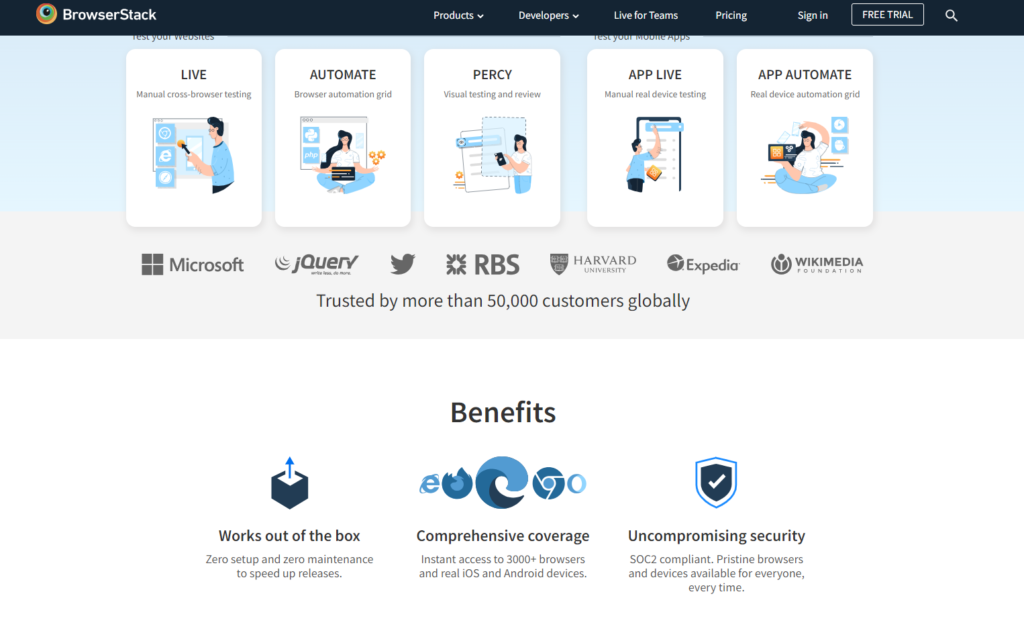
BrowserStack is a cloud-based web application testing platform that enables testers to perform real-time testing across various browsers and devices.
With its extensive device and browser coverage, BrowserStack empowers teams to ensure cross-browser compatibility and deliver seamless user experiences.
About BrowserStack
BrowserStack is a leading cloud-based testing platform trusted by thousands of organizations worldwide. Unfortunately, specific information regarding the company’s valuation and employee numbers is not publicly available.
However, their commitment to providing reliable testing solutions has made them a go-to choice for many testing professionals.
Key Features of BrowserStack

- Real-time testing on multiple browsers, devices, and operating systems
- Local testing capability for debugging and testing on internal servers
- Integrations with popular development and testing tools
- Automated screenshot comparison for visual regression testing
- Network and geo-location testing for comprehensive coverage
Pros of using BrowserStack
- Extensive browser and device coverage for comprehensive testing
- User-friendly interface with real-time testing capabilities
- Collaborative features for seamless team collaboration
- Integration with popular development and testing tools
Cons of using BrowserStack
- Pricing may be a concern for small or budget-conscious teams
- Limited access to some advanced features in lower-tier plans
Pricing
BrowserStack offers various pricing plans based on the needs of different organizations, with different levels of features and support.
Our Review of BrowserStack
BrowserStack provides a powerful cloud-based testing platform for teams seeking comprehensive cross-browser and cross-device testing capabilities. With its extensive browser and device coverage, real-time testing, and collaborative features, BrowserStack stands out as a reliable choice.
However, pricing may be a consideration for smaller teams or those on a tight budget. Overall, BrowserStack’s robust features and ease of use make it a valuable tool for ensuring website application compatibility and delivering high-quality user experiences.
7. Testsigma
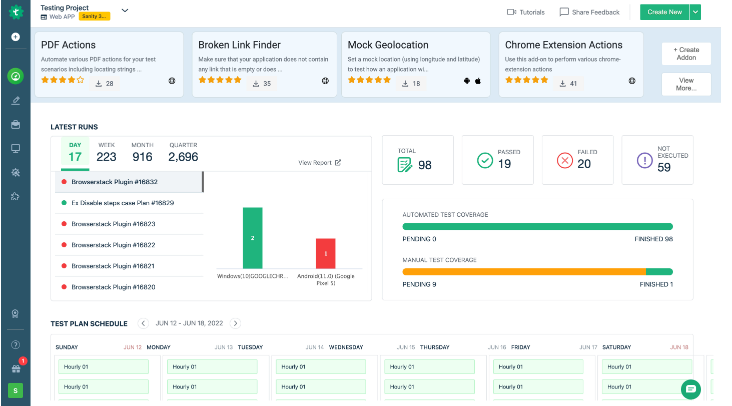
Testsigma is a cloud-based test automation platform designed to simplify test creation and execution. It leverages artificial intelligence and natural language processing to enable testers to create and maintain tests quickly and efficiently.
About Testsigma
Founded in 2016, Testsigma is a relatively new entrant in the market. While specific information about the company’s valuation and employee numbers is not readily available, their focus on AI-driven test automation solutions has garnered attention.
Key Features of Testsigma

- AI-powered self-healing tests for robust maintenance
- Natural language-based test creation using English-like syntax
- Test case management and version control
- Seamless integration with popular CI/CD tools
- Cross-browser and mobile app testing capabilities
Pros of using Testsigma
- AI-powered self-healing tests reduce maintenance efforts
- English-like syntax simplifies test creation for non-technical users
- Intuitive user interface for easy test management
- Robust integration options with popular CI/CD tools
Cons of using Testsigma
- Relatively new in the market, with limited community support
- Limited advanced customization options for complex testing scenarios
Pricing
Testsigma offers various pricing plans based on the needs of different organizations, with different levels of features and support.
Our Review of Testsigma
Testsigma offers a user-friendly and AI-driven approach to test automation, making it an attractive choice for teams looking to simplify test creation and maintenance.
The AI-powered self-healing tests and natural language-based test creation provide a significant advantage in reducing maintenance efforts and enabling non-technical users to create tests.
However, as a relatively new tool, it may have limited community support and advanced customization options compared to more established players. Nevertheless, for teams seeking a streamlined and intuitive test automation experience, Testsigma is worth exploring.
8. TestComplete

TestComplete is a comprehensive automated testing tool that supports website, mobile, and desktop applications.
With its powerful scripting capabilities and built-in test management features, TestComplete helps teams create, execute, and manage automated tests effectively.
About TestComplete
TestComplete, developed by SmartBear, is one of the widely recognized web testing tools trusted by many organizations.
While specific information about the company’s valuation and employee numbers is not readily available, their commitment to providing robust testing solutions is evident in TestComplete.
Key Features of TestComplete

- Cross-platform testing for web, mobile, and desktop applications
- Scripting support for various languages, including JavaScript and Python
- Object recognition and identification for efficient test creation
- Integrated test management and reporting capabilities
- Test execution across multiple environments and configurations
Pros of using TestComplete
- Comprehensive testing capabilities for web, mobile, and desktop applications
- Support for multiple scripting languages for flexibility
- Robust object recognition for reliable test creation
- Integrated test management features streamline testing workflows
Cons of using TestComplete
- Steeper learning curve for beginners due to its advanced capabilities
- Pricing may be a concern for small or budget-conscious teams
Pricing
TestComplete offers various pricing plans based on the needs of different organizations, with different levels of features and support.
Our Review of TestComplete
TestComplete stands out as a comprehensive automated testing tool with its cross-platform support and robust features. Its ability to handle testing for web, mobile, and desktop applications makes it a versatile choice for organizations with diverse testing requirements.
The support for multiple scripting languages provides flexibility to testers, and the integrated test management features enhance testing workflows.
However, beginners may find the tool’s advanced capabilities challenging to grasp initially, and the pricing structure may be a consideration for smaller teams.
Overall, TestComplete proves to be a reliable choice for organizations seeking a comprehensive testing tool for their website, mobile, and desktop applications.
9. Selenium
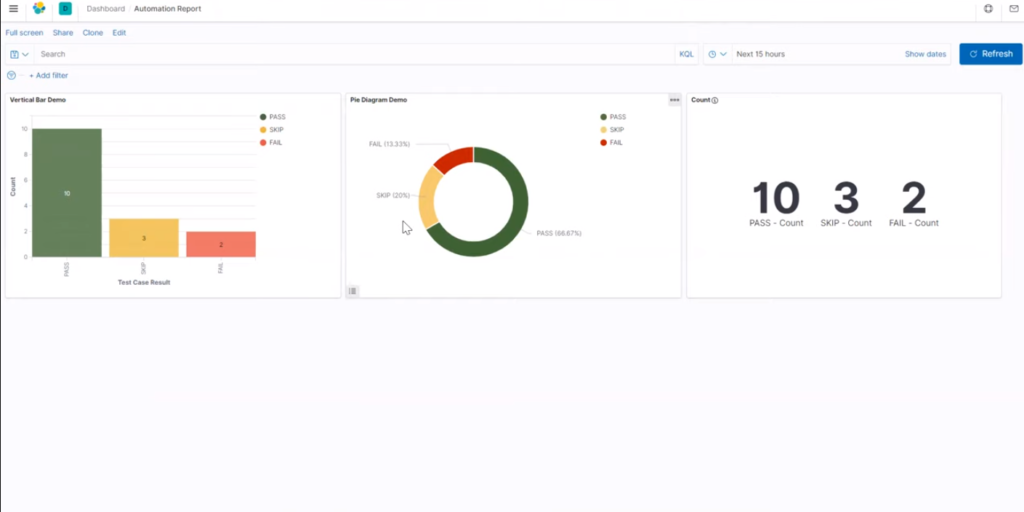
Selenium is a widely adopted open-source web application testing framework. With its robust set of tools and libraries, Selenium enables testers to automate browser actions and validate web application functionality across different platforms.
About Selenium
Selenium has a strong community of users and contributors, making it one of the most popular testing frameworks in the industry.
While specific information about the company behind Selenium is not available, its open-source nature and community support have made it a go-to choice for web application testing.
Key Features of Selenium

- Supports multiple programming languages, including Java, Python, and C#
- Cross-browser and cross-platform testing capabilities
- Extensible architecture with various testing frameworks and integrations
- Integration with popular CI/CD tools for seamless automation workflows
- Wide range of browser compatibility for comprehensive testing
Pros of using Selenium
- Open-source framework with a vast community support network
- Support for multiple programming languages offers flexibility to testers
- Extensible architecture allows integration with various testing tools
- Wide browser compatibility ensures comprehensive testing coverage
Cons of using Selenium
- Requires coding skills for test automation scripting
- Steeper learning curve for beginners
- Limited support for non-web-based applications
Pricing
Selenium is free and open-source, making it accessible to organizations of all sizes.
Our Review of Selenium
Selenium’s open-source nature and extensive community support has made it a popular choice for web application testing. Its wide range of supported programming languages and compatibility with multiple browsers and platforms provide flexibility and comprehensive testing coverage.
However, Selenium does require coding skills for test automation scripting, which may pose a challenge for non-technical users. Additionally, beginners may face a steeper learning curve when getting started with Selenium.
Nevertheless, with the vast resources and active community, Selenium remains a reliable and powerful testing framework for web applications.
10. Cypress

Cypress is a modern JavaScript-based testing framework designed for web applications. It emphasizes simplicity and efficiency, allowing testers to write intuitive and reliable tests that run directly in the browser.
About Cypress
Cypress is a popular web application testing framework known for its developer-friendly approach and seamless test execution experience.
While specific information about the company behind Cypress is not available, their commitment to providing an intuitive testing solution is evident in their framework.
Key Features of Cypress

- Easy setup and installation with minimal dependencies
- Real-time reloading for rapid test development and feedback
- Automatic waiting and retrying for reliable test execution
- Powerful debugging and logging capabilities
- Time-traveling for easy troubleshooting
Pros of using Cypress
- Simple and intuitive syntax for writing tests
- Real-time reloading enhances test development speed
- Powerful debugging capabilities simplify issue resolution
- Comprehensive documentation and strong community support
Cons of using Cypress
- Limited support for non-JavaScript languages
- Lack of built-in support for cross-browser testing
- Requires a deep understanding of JavaScript for advanced customization
Pricing
Cypress is an open-source testing framework, making it freely accessible to organizations. It also offers paid plans for others.
Our Review of Cypress
Cypress is a modern testing framework that prioritizes simplicity and efficiency. Its intuitive syntax and real-time reloading feature make test development and feedback cycles seamless.
The powerful debugging capabilities and comprehensive documentation further enhance the testing experience. However, Cypress’s primary focus on JavaScript and lack of built-in support for cross-browser testing may limit its suitability for organizations with diverse testing needs.
Additionally, advanced customization and troubleshooting may require a deep understanding of JavaScript.
Nevertheless, for teams looking for an easy-to-use and efficient testing framework for web applications, Cypress is a valuable option.
Frequently Asked Questions – FAQs
1. What are the advantages of using web automation testing tools?
- Web automation testing tools help automate repetitive tasks, saving time and effort.
- They improve test coverage and enable faster feedback cycles.
- These tools enhance collaboration between developers and testers.
2. Are there any free web application testing tools available?
Yes, several free web application testing tools, such as Katalon Studio (free version), Selenium, and Cypress, offer robust features without requiring a commercial license.
3. Can web application testing tools support manual testing?
Yes, many web application testing tools offer support for both manual and automated testing, providing flexibility based on specific testing needs.
4. Are open-source web application testing tools as reliable as commercial ones?
Open-source web application testing tools, such as Selenium and Appium, have a strong community backing, making them reliable options. However, commercial tools often provide additional features, support, and advanced functionalities.
5. How can web application testing tools help ensure cross-browser compatibility?
Web application testing tools, such as BrowserStack and LambdaTest, enable testers to execute tests across multiple browsers and operating systems, ensuring compatibility and identifying any issues early on.
Wrapping Up
In conclusion, we explored the top web application testing tools available, covering both free and open-source options. We provided in-depth analyses, key features, pros and cons, pricing details, and our reviews for each tool.
Additionally, we presented a comprehensive comparison chart to assist you in making an informed decision based on your specific requirements. To ensure the quality, reliability, and compatibility of your web applications, choose the right web application testing tool.
There is a tool for every need, whether it’s user-friendly, AI-driven, open-source, or commercially supported. Use the best web application testing tools to automate, collaborate, and streamline your processes.
- 5 Best DevOps Platform and Their Detailed Guide For 2024 - December 26, 2025
- Top 10 Cross Browser Testing Tools: The Best Choices for 2024 - October 28, 2025
- 5 Best API Testing Tools: Your Ultimate Guide for 2024 - October 26, 2025


